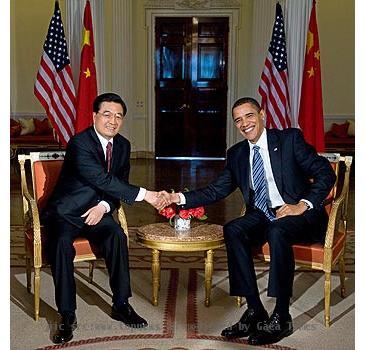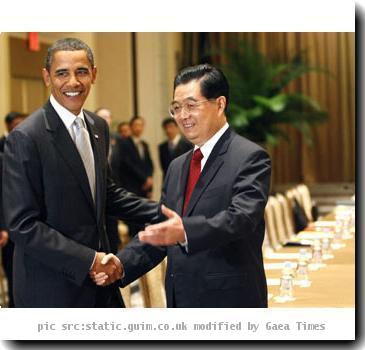Amid talks with Washington, fear of economic slide at home, China tones down anti-US rhetoric
By Charles Hutzler, APSunday, April 11, 2010
Setbacks lead China to tone down anti-US rhetoric
BOAO, China — China is softening its recent muscular global posture, muting criticisms of the U.S. at a time of delicate negotiations with Washington and simmering economic troubles at home.
The rhetorical respite comes as President Hu Jintao heads to Washington this week, after months of friction with the U.S., and was in full evidence this weekend at an international meeting designed to showcase China’s growing reach as an economic and diplomatic powerhouse.
Senior Chinese officials repeatedly sidestepped major issues roiling the global economy. Asked about the Chinese currency — which Washington wants to see rise in value to right trade imbalances — the central bank governor said now was not the time to discuss it. When it comes to regulating the risky Wall Street practices that contributed to the global economic meltdown, China’s chief banking regulator sheathed his former critiques and instead called for teamwork and more financial prudence.
“I don’t want to poke my nose into other people’s courtyards,” banking regulator Liu Mingkang said Sunday at the Boao Forum for Asia, a government-sponsored annual gathering for the political and economic elite on tropical Hainan island.
The meeting featured the now usual Chinese calls against trade protectionism in the West, including one from China’s vice president and presumptive next leader, Xi Jinping.
But the tenor was a far cry from last year’s Boao meeting, held at the depths of the economic crisis. Then, Liu and others directed barbs at the U.S., calling for a new financial world order and indirectly threatening that China might stop buying U.S. Treasury notes that help finance Washington’s growing deficit. The elbowing continued for much of the year as Beijing resisted U.S. and European calls to halt North Korea’s and Iran’s nuclear programs and take bolder steps to curb the threat of climate change.
While the turnaround in Beijing’s attitude may be temporary, the change points to indecision among the leadership about China’s role in the world, especially its crucial but fraught ties with the U.S., and about keeping the Chinese economy humming amid a still anemic global recovery.
“We are in a time of reassessment by Beijing about China’s foreign policy,” said Russell Leigh Moses, a Beijing-based political analyst. “There is no overarching slogan or concept guiding the decision-making process in foreign affairs these days here.”
Though Washington likely welcomes the toned-down rhetoric, China’s overall reticence befuddles the U.S. and others looking to Beijing to provide constructive leadership. The country’s economy, after all, will soon be the second largest and is increasingly entwined in the world order.
Though China warded off the worst of the economic turmoil, it now feels the aftereffects of its remedies, $1.8 trillion in bank lending and government stimulus.
With the economy awash in money, housing prices are soaring and inflation is rising. The domestic demand created by supercharged investment may flag as the stimulus eases, leaving China still partly in need of export markets in the U.S. and Europe. The Chinese currency — which the government pegged to the U.S. dollar at the start of the crisis — has been attacked by the U.S., Europe and other trading partners as undervalued, thereby allowing China to flood the world with cheap exports.
Worries are growing, too, that some of the bank loans may sour. Liu, the banking regulator, announced an aggressive plan Sunday to assess the safety of loans to local government-backed investment companies.
Those problems loom as Chinese President Hu arrives in Washington on Monday to attend a summit on nuclear safety. It’s an issue Beijing dislikes being out front on. With a nuclear arsenal estimated at about 100 warheads, China says the U.S. and Russia should lead on disarmament, given their huge stockpiles. Beijing has also been reluctant to push ally and neighbor North Korea or trade partner Iran, a willing supplier of oil and gas to China.
Yet the economic disputes are also tricky for Hu. Calls have risen in Congress to punish China if it does not revalue the yuan. Though U.S. Treasury Secretary Timothy Geithner briefly stopped in Beijing last week to take some of the heat out of dispute, China also does not like to be seen bowing to foreign pressure. The value of the yuan, Chinese officials and economists repeatedly said at the Boao forum, was a matter of national sovereignty.
At the Boao meeting, senior Chinese officials parried calls from Geithner’s predecessor, Henry Paulson, among others to mount a higher-profile, energetic response to global problems. Central bank governor Zhou Xiaoquan said Beijing still followed three-decade-old policy guidance “to keep a low profile” on foreign affairs.
“The Chinese voices may become higher and higher,” Zhou said. “But we respect the global players from other countries.”
Tags: Asia, Beijing, Boao, China, East Asia, Government Regulations, Greater China, Hu Jintao, Industry Regulation, North America, North Korea, United States

